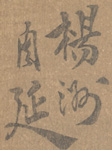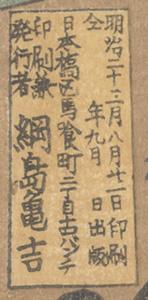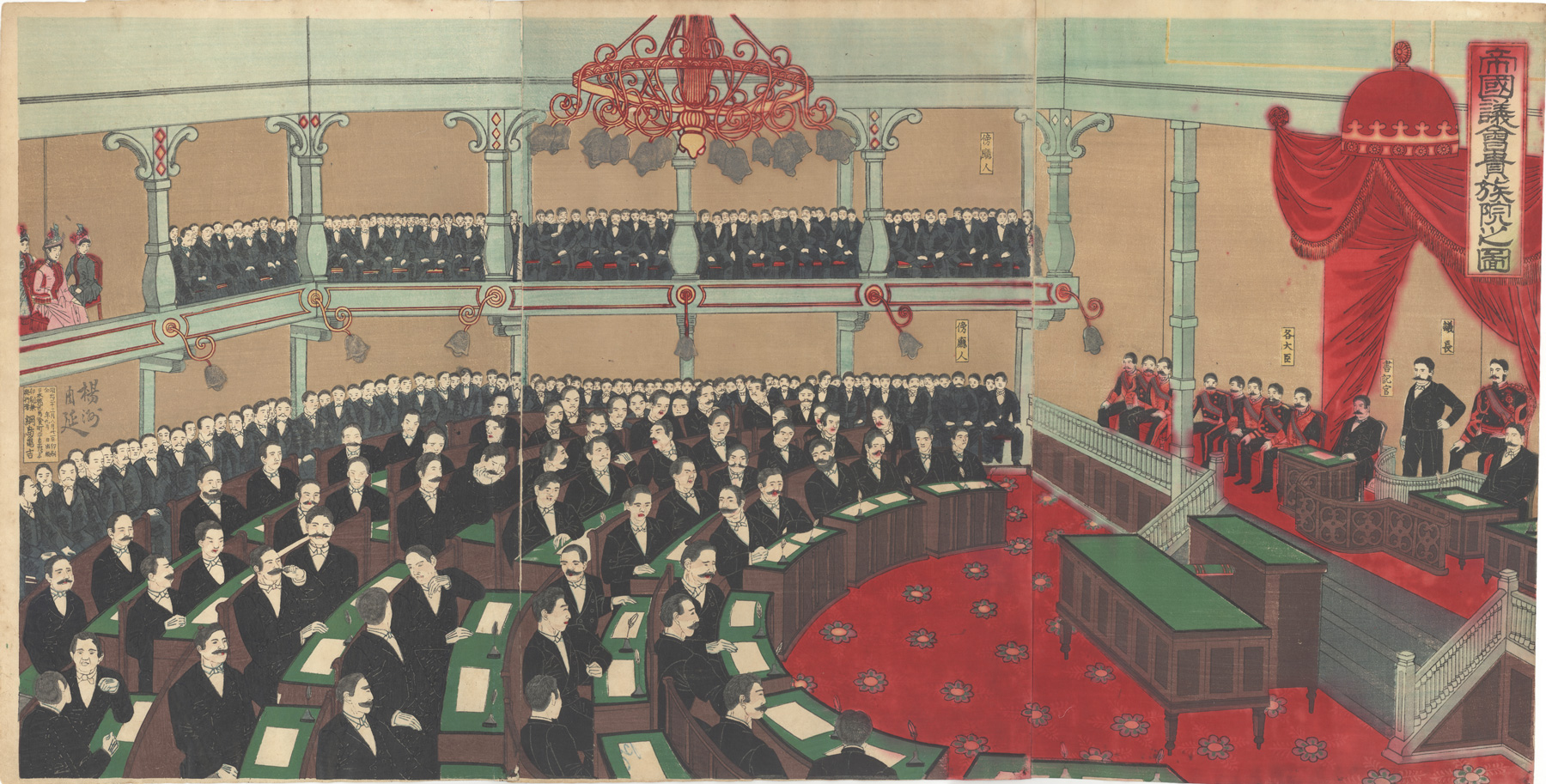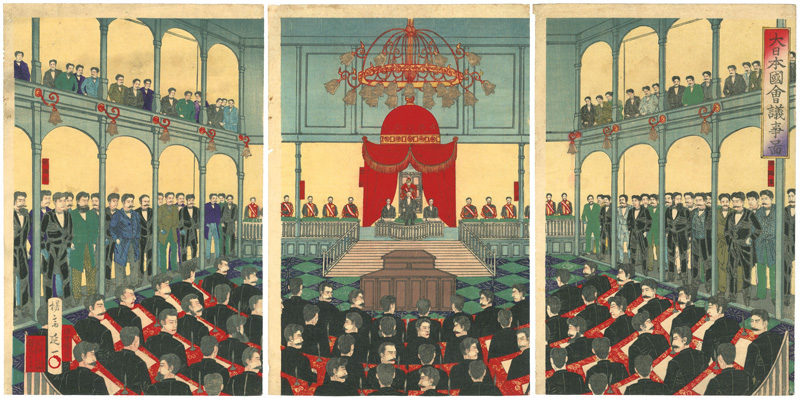About This Print
Picturing a meeting of the Imperial Diet's House of Peers, the upper house of the Imperial Diet consisting of appointed high-ranking nobles, this print was published in September 1890, two months before the actual first meeting of the House of Peers (貴族院 Kizoku-in) on November 29, 1890. This type of portrayal of future events was not unusual, as the Meiji government encouraged publishers to "introduce the public to this new institution [a European-style parliament] and its members."1 This print is similar to several others that depicted what the future House of Peers would look like, so the government may have provided access or at least renderings of the future meeting chambers. (For an example of a similar looking print by the artist Watanabe Nobukazu see below.) The five small yellow cartouches in the right side of the print identify the audience [bōchōnin 傍聽人 (傍聴人)], seated in the balcony and behind the peers; the cabinet ministers [各大臣 kaku daijin], the secretary for the House of Peers [書記官 shokikan) and the President of the House of Peers [議長 gichō].Not called out on the print, but pictured, is the Empress, with her attendants in the balcony on the left, and the Emperor, sitting on the dais.
The first President of the House of Peers was the statesman Itō Hirobumi 伊藤博文, who accepted the position under the urging of the Emperor with an understanding the could resign after the first year, which he did, serving until July 20, 1891.
大日本国会議事
Watanabe Nobukazu (1872-1944)
The Meiji Constitution
The Meiji Constitution was adopted on February 11, 1889 and the Imperial Diet first met on November 29, 1890 when the document entered into operation. The Diet consisted of a House of Representatives and a House of Peers. The House of Representatives was directly elected, if on a limited franchise; universal adult male suffrage was introduced in 1925. The House of Peers, much like the British House of Lords, consisted of high-ranking nobles.
Also see the article Prints of the Emperor Meiji and Empress Haruko.
Also see the article Prints of the Emperor Meiji and Empress Haruko.
1 Japan at the Dawn of the Modern Age – Woodblock Prints from the Meiji Era, Louise E. Virgin, Donald Keene, et. al., MFA Publications, 2001, p. 60.
PowerPoint Presentation Notes from 1-31-2017 Presentation
Illustration of the Imperial Assembly of the House of Peers, September 1890 Picturing a meeting of the Imperial Diet's House of Peers, consisting of appointed high-ranking nobles, this print was published in September 1890, two months before the actual first meeting on November 29, 1890. Portrayal of future events was not unusual, and the Meiji government encouraged publishers to "introduce the public to this new institution and its members."The five small yellow cartouches in the right side of the print identify those present as: the "audience" (seated in the balcony and behind the peers); the cabinet ministers, the secretary for the House of Peers and the President of the House of Peers. . Not called out on the print, but pictured, is the empress with her attendants in the balcony on the left, and the emperor, sitting on the dais.
Print Details
| IHL Catalog | #1515 |
| Title or Description | Illustration of The Imperial Assembly of the House of Peers 帝国議会貴族院之図 Teikokugikai kizokuin no zu |
| Series | |
| Artist | Yōshū Chikanobu (1838-1912) |
| Signature |  |
| Seal | not sealed |
| Publication Date | August 21, 1890 Printed: Meiji 23 eighth month 21st day 明治二十三八月廿一日印刷 Publication: Meiji 23 ninth month 明治二十三九月 日出版 |
| Publisher |  [Marks: pub. ref. 549; seal not shown] |
| Impression | excellent |
| Colors | excellent |
| Condition | good – 3 unbacked sheets joined together; two full length vertical folds; ink offsetting on right and center panels |
| Genre | ukiyo-e; kaika-e |
| Miscellaneous | |
| Format | vertical oban triptych |
| H x W Paper | 14 9/16 x 28 3/8 in. (37 x 72.1 cm) |
| H x W Image | 14 1/8 x 28 in. (35.9 x 71.1 cm) |
| Literature | |
| Collections This Print | Metropolitan Museum of Art JP3422; Spencer Museum of Art, University of Kansas 2002.0126.a,b,c |



